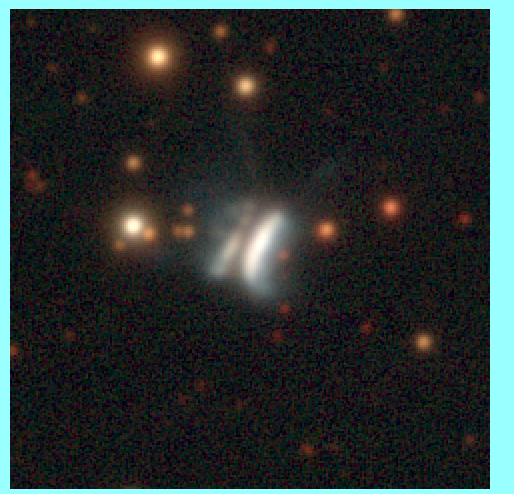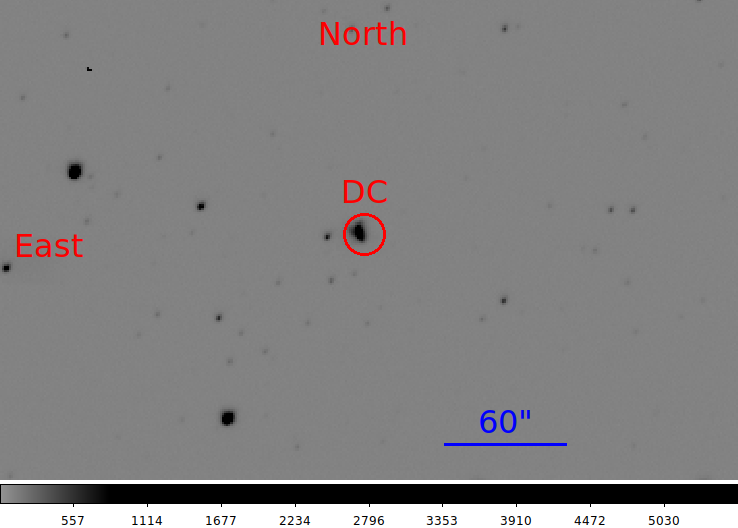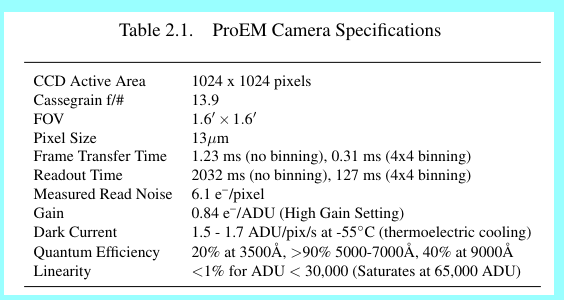Jump to bottom of page
ProEM observations of Dracula's Chivito
Inception date: Aug07,2024
Last updated: Aug13,2024
Primary List
- Introduction
- Running notes.
- Observing strategy.
- Reduction steps.
Introduction
We are attempting to observe a young stellar object with ProEM on
the McDonald 82". I went up to the 82" today (Aug07,2024) and saw
the ProEM is mounted at the Cass focus. If it stays there (?) ths
will means we should have a 1.6' x 1.6' field of view.
Below I show a color composite made with PANSTARRS data
and a crude finder chart from ZTF data that may be useful at the telescope.
 |
A color composite from PANSTARRS imagery of Dracula's Chivito.
I am unsure of the sky orientation.
Position: 23:09:43.00 +67:23:40.0 J2000
|
 |
Finding chart for Dracula's Chivito made with ZTF image. This was
a 30 second image in the Gunn g filter.
Image: ztf_20181108331701_001862_zg_c12_o_q1_sciimg.fits
Position: 23:09:43.00 +67:23:40.0 J2000
Note that I did check the orientation of this image the morning
of Feb09,2024. I used the original ZTF image and the WCS in
that FITS image with ds9 to confirm that RA increases to the left (Esat)
and Dec increases to the top (North).
|
Here are some of the ProEM properties.
 |
Below is a table of ProEM specifications. I received this
from Zach Vanderbosch (zvanderb@caltech.edu) a forme student
of Don Winget (I think). Here is part of his email:
Hi Steve,
I'm not sure what all information you are looking for, but here is a table from my
dissertation showing some of the camera's general specifications when attached
at Cassegrain focus (see above). And hopefully the instructions for this are in
the observing manual Mike sent, but you can extract individual FITS files from
Lightfield's .spe file once data acquisition is complete, using some tools in the
Lightfield GUI. Happy to help if there's any other info you need.
Cheers,
Zach
|
Jump to top, bottom, qlist
Observing strategy.
Summary of things learned on night of Aug08,2024 with Isaac Lopez,
Judith Korth, and Jimi Lowrey.
% >cat /home/sco/Jimi/README.strategy
Hi Jimi and Judith and John (JJJ):
I wanted to summarize a few things we saw last and how they might
shape the observing strategy for tonight.
1) The dark signal in ProEM is significant, and we should
procure calibration dark frames with 10, 20, and 30 second
integration times.
2) Once Dracula's Chivito (DC) is observed, you should check that
none of the stars is saturated. Pick the shortest integration
time that gives reasonable images (i.e. you can see the
asymmetric structure of DC). I suspect this will be at least
20 or 30 seconds based on the Palomar 30 second images I have
been playing with.
3) Take sets of images using the 10, 20, or 30 sec integration time
in g, r, i. It is important that each set have a folder name that
gives the filter name. If you think you may observe a few stars
before DC is reachable, then maybe a target name might be good.
Finally a set number might be useful (e.g. the 4th set of g images
of DC).
EXAMPLE:
A folder name syntax might be: DC_set2_g
This would be the name for the second set of observations
of Dracula's Chivito in the g filter.
4) A good set of bias frames and (gri) flats will be needed. I'm
not sure why Isaac was using N=31 images, but this seems a
reasonable choice, so maybe we stick with that. I can reduce
the imageary using smaller subsets if we decide to do that
later. As I recall, for the dome flats Isacc used:
Voltage=20 and 1sec exposure time for i
Voltage=20 and 3sec exposure time for r
Voltage=40 and 3sec exposure time for g
5) Prior to observing DC, you might have time to just observe any
field in (short) sets of gri that has a few stars (a dozen or
so would be great). The critical thing is the you record an
Ra,Dec for this field (whatever you call it). Thin we can
always gather PANSTARRS gri photometry to derive a photometric
zeropint.
Hope this does not sound too bossy! I really just wanted to stress that
it will be very important to make clear which filter is being used for
each folder you observe in.
Let me know if you think I am missing any important points.
Good luck,
Steve
P.S. Remember you can reach me at HET tonight with the VOIP
phones use 689. Also I will habe cell phone: 432-755-2782
Jump to top, bottom, qlist
Reduction steps
These are the reduction steps I use to analyse the Aug10,2024 ProEM
images we took of DC. The code I use are
proem_rename.sh.
% cd /home/sco/Jimi/Red1
% proem_rename.sh List.0 -t
OR
% proem_rename.sh List.0 -t -c proem.conf
% clip_stacker.sh list.0 median Bias.fits
OR
% big_stack --help
% big_stack LIST.ALL 7 median BOOTY
# This makes Big_Stack.fits using 4x7 images (28 images), Looks good
% clip_imarith.sh DARK30.fits - BIAS.fits o.fits
% clip_imarith.sh S1.fits - o.fits Stack81_prof.fits
Jump to top, bottom, qlist
Back to SCO CODES page
Back to Big List of Codes page
Jump to top of page



